
Guests
- Alex Abdolitigation director of the Knight First Amendment Institute at Columbia University.
- Mahmoud KhalilPalestinian rights advocate targeted by the Trump administration for campus protests at Columbia University.
- Todd Wolfsonpresident of the American Association of University Professors.
Links
A Reagan-appointed judge has issued a scathing ruling rebuking the Trump administration’s targeting of pro-Palestine students. Judge William G. Young called the case AAUP v. Rubio “perhaps the most important ever to fall within the jurisdiction of this district court” and ruled that contrary to the State Department’s claims, “non-citizens lawfully present here in [the] United States actually have the same free speech rights as the rest of us.”
For more, we’re joined by lawyer Alex Abdo, who worked on the case; Todd Wolfson, president of the plaintiff, the American Association of University Professors; and Palestinian activist Mahmoud Khalil, whose arrest and targeting by the Trump administration in March kicked off a heightened scrutiny of immigrants living and working on U.S. college campuses. “If free speech means anything in this country, it means masked government agents can’t pick you up off the street and throw you into jail because of what you’ve said,” explains Abdo. He adds that the ruling will help support Khalil against the Trump administration’s ongoing attempt to deport him. Details that emerged during the trial revealed that the Trump administration is continuing to target Khalil “to make an example out of me.”
Transcript
AMY GOODMAN: This is Democracy Now!, democracynow.org. I’m Amy Goodman, with Juan González.
A Reagan-appointed judge in Boston has issued a scathing rebuke of the Trump administration for illegally trying to deport pro-Palestinian international students and academics. The lawsuit was filed by the Knight First Amendment Institute at Columbia University on behalf of the AAUP — that’s the American Association of University Professors — in March.
In his 161-page decision, U.S. District Judge William Young wrote, quote, “This case — perhaps the most important ever to fall within the jurisdiction of this district court — squarely presents the issue of whether non-citizens lawfully present here in [the] United States actually have the same free speech rights as the rest of us. The Court answers this Constitutional question unequivocally 'yes, they do.'”
Young went on to write, “The First Amendment does not draw President Trump’s invidious distinction and it is not to be found in our history or jurisprudence. … No one’s freedom of speech is unlimited, of course, but these limits are the same for both citizens and non-citizens alike.”
Judge Young also wrote, quote, “this court finds by clear and convincing evidence that the Secretary of Homeland Security Kristi Noem and the Secretary of State Marco Rubio, together with the subordinate officials and agents of each of them, deliberately and with purposeful aforethought, did so concert their actions and those of their two departments intentionally to chill the rights to freedom of speech and peacefully to assemble of the non-citizen plaintiff members,” unquote.
Judge Young’s published ruling begins in an unusual fashion. At the top of his opinion, he included a scanned image of an anonymous threat that had been sent to his chambers in June that ominously asked, quote, “Trump has pardons and tanks.. .. What do you have?” unquote. Below the postcard, Judge Young wrote this message: “Dear Mr. or Ms. Anonymous, Alone, I have nothing but my sense of duty. Together, We the People of the United States — you and me — have our magnificent Constitution. Here’s how that works out in a specific case,” unquote. And he went on to lay out his decision.
We’re joined now by three guests. The lawsuit was filed after federal agents detained Columbia University student protest leader Mahmoud Khalil in March, after he took part in Palestine solidarity protests at his university, Columbia. He was held for over a hundred days in an ICE jail in Louisiana. During that time, his wife, Dr Noor Abdalla, gave birth to their first child, Deen. Mahmoud was released June 20th, but the Trump administration is still trying to deport him. He’s joining us from Brooklyn.
In Philadelphia, we’re joined by Todd Wolfson, president of the AAUP. That’s the American Association of University Professors.
And in studio with us in New York, Alex Abdo is with us, litigation director of the Knight First Amendment Institute at Columbia University.
We welcome all of you back to Democracy Now! Alex, let’s begin with you. I mean, the significance of this scathing decision? The judge basically said it’s the most important of his career.
ALEX ABDO: It’s a historic decision, and it reaffirms what should have been obvious, which is that if free speech means anything in this country, it means masked government agents can’t pick you up off the street and throw you into jail because of what you’ve said. In ordinary times, you would expect the Department of Justice to react to a ruling like this by saying, “Of course, we are not intentionally targeting people for their political views.” But instead, the administration has doubled down on the legal theory it has behind the case, which is why it’s so important that you have a federal judge, a judge who’s been on the bench for decades, speaking so clearly and cogently about the stakes of this case and the other efforts by this administration to crack down on dissent and political speech it doesn’t like.
JUAN GONZÁLEZ: Alex, at the same time, though, the judge deferred a decision about what remedy to impose and said he’s going to schedule a hearing promptly. What does that mean? And how do you see the case developing from here?
ALEX ABDO: Well, he divided the case into two sections. The first, which is the one we just finished, focused on the question of: Is the administration, in fact, targeting pro-Palestinian protesters on the basis of their speech? And if so, does that violate the First Amendment? And he answered both of those questions, unequivocally, yes. The government has, in fact, been targeting protesters on the basis of their speech, and that violates the First Amendment.
And now the question is going to be what remedy he’ll issue. And we’re going to have, presumably, briefing about that question, and we’ll ask Judge Young to take a series of measures designed to prevent what has been going on in the cases of these individual protesters.
AMY GOODMAN: So, I want to talk to one of these protesters, Mahmoud Khalil, but first tell us: What does it mean that an immigration judge has just ruled Mahmoud can be deported to Syria or Algeria, but now this decision has come down?
ALEX ABDO: Well, I think this decision will provide ammunition to the legal teams in his case and in the cases of the other protesters, who have been trying to convince immigration judges that the reason they were targeted was for their speech. And the administration, you know, the federal administration, has held out the possibility that they have some kind of secret evidence demonstrating that what was going on here was more than just the targeting of speech.
But Judge Young, in our case, had access to all of the underlying documentation, because he let us go through a period of discovery. And he took these documents from the government, and he reviewed them, and he was unimpressed. And he held, again, unequivocally, that what was going on here was the targeting of political speech.
AMY GOODMAN: So, let’s bring Mahmoud Khalil into this discussion. Mahmoud is a graduate and a green card holder, but a graduate of Columbia University, arrested and detained March 8th, International Women’s Day, as he and his wife were coming into their university housing, and held for more than a hundred days in Louisiana. Your response to this ruling? Clearly, the judge was furious, saying that your detention was unconstitutional, or the targeting of you was unconstitutional, Mahmoud.
MAHMOUD KHALIL: Thank you so much, Amy.
And absolutely, it’s a welcome decision. And as Alex said, this would provide us with ammunition in our legal case against the administration. And basically, it affirmed what we already knew from the beginning, that this Trump administration is targeting us to chill speech across the country, chill pro-Palestine speech across the country. And they wanted to find a base for that. Like, even in — I mean, the court documents revealed a lot of, a lot of important details about the process of targeting me and other students. They had no basis, yet they brought this foreign policy determination. And after they felt that they would lose on that, which now they did, they resorted to bringing baseless charges, fraud charges against me, to have another leg to stand on.
And another — one other important thing about this particular ruling is that the judge said that speaking up for Palestine and for Palestinian liberation is protected, is not supporting terrorism, as this administration is trying to do. And as you said, Rubio and Noem, with the support of the White House, too, they technically conspired to deprive us from our freedom of speech so that they can advance their ideological agenda in this country.
JUAN GONZÁLEZ: But, Mahmoud, earlier this month, a judge in Louisiana ruled that you are deportable. What are your lawyers saying about how this decision will affect that one? And what’s the status of that Louisiana decision right now?
MAHMOUD KHALIL: Yeah, the immigration courts are kangaroo courts. They answer to the attorney general, to the executive branch. They’re basically affirming a decision or a court ruling, an immigration court ruling, that I’m deportable based on baseless charges. So, as I’ve said before, this case now shows to the federal court, to my federal court in New Jersey, that the administration, the Trump administration, basically conspired to deport me. They had no legal basis to do that.
And they say it in one of the documents that was presented in the case. They said they had no alternative grounds to deport me. So, this is — this would be very important, because that would show that the administration actions against me, in particular, are in retaliation of my freedom of speech and designed to make an example out of me, so that others would be afraid of speaking out.
JUAN GONZÁLEZ: I wanted to bring in Todd Wolfson, as well, the president of the American Association of University Professors, former colleague of mine at Rutgers University. Todd, your response to the judge’s decision, and why the AAUP felt so that it needed to be a plaintiff in this case?
TODD WOLFSON: Yeah, I mean, we’re really happy about this decision as a step forward. I mean, as Mahmoud and Alex detailed, it just confirms what we knew, that this was unconstitutional and illegal, these abductions for political speech.
And the reason we took this case on is because, you know, faculty, students and staff in higher education are living in fear right now. The Trump administration is purposefully attacking our sector, attacking our speech rights, attacking our institutions, whether it’s Columbia and Harvard or UCLA. And we felt like it was critical to step up and step into this fight through the courts and through other mechanisms to push back and to defend our members, who are largely faculty, but also students and staff working on our campuses.
AMY GOODMAN: I wanted to go back to Mahmoud Khalil. Mahmoud, we were there at Newark Airport when you were flown back in, after being released from that ICE jail in Jena, Louisiana. You reunited with your wife, with Dr. [Noor] Abdalla, an American citizen, a dentist, who was — you were taken from her in March as the two of you were standing in the lobby of your building. And then you had to experience your son Deen’s birth over the telephone in jail as your wife gave birth. Can you talk about what this experience has been like for you, the effect of this jailing? Now you’ve been out for a few months. I mean, you’ve been standing in Congress with Rashida Tlaib. You’ve spoken all over. We saw you at Columbia University, surrounded by professors, by activists, by people celebrating your release. But what has it meant, and also to spend this last months with your little baby?
MAHMOUD KHALIL: Thank you, Amy. I mean, it has been absolutely great to be reunited with the family and to make up for the time that was stripped from us, from my wife Noor and my son Deen. That’s why, you know, like, I’m cherishing these moments.
But also, that means that I have a duty. I have a responsibility to continue to speak up against what’s happening to me and to my people. That explains why I’m involved in these steps to seek accountability, because, let’s be clear, nothing would ever make up for the time missed away from my family, for missing the birth of my child, not this ruling, not any other ruling. That’s why I will continue to seek accountable, so this doesn’t happen to anyone else, and that the administration would feel deterred to — from continuing to targeting people for their freedom of speech.
And it’s very important to continue to speak out, because this is what this administration and — this is what the court now confirmed, that this administration’s intention was to chill our speech. So, I want to continue to speak up against this administration, to show that they will never succeed in silencing us, in silencing us against all the atrocities that are happening against our people in Palestine.
AMY GOODMAN: Alex Abdo, you’re with the Knight First Amendment Center, which brought the case. And the people that you talked about who were targeted, there was Mahmoud, taken on March 8th. A few weeks later, Mohsen Mahdawi was taken, another Palestinian student, who’s now a graduate student at Columbia. He went to court yesterday in downtown Manhattan, as did Rümeysa Öztürk, the Tufts University student. They were both in federal court. Can you explain how this decision affects what’s happening to them right now?
ALEX ABDO: Yeah. So, they were both in court yesterday, because the government has argued that they’re not entitled to challenge their detention, even if the government threw them in jail specifically for the reason of trying to silence their speech and to chill others.
And the hope is that a ruling like yesterday’s will break the spell, because the goal of this administration in all of these cases in which it is cracking down on political speech is to silence dissent. They’re not trying to win in court, because they can’t, because the legal theories they’re advancing are preposterous and in another era would have been shameful for DOJ lawyers to present in federal court. But we need to break the spell. We need more people like Judge Young, like Mahmoud Khalil, to call it for what it is, which is a concerted effort by the federal government to crack down on political speech. So, if this decision contributes in small part to breaking the spell, then I think it will have been a success.
AMY GOODMAN: Alex Abdo, we want to thank you so much for being with us, litigation director of the Knight First Amendment Institute at Columbia University; Todd Wolfson, speaking to us from Philadelphia, president of the American Association of University Professors; and Mahmoud Khalil, Columbia University graduate and activist who spent over a hundred days in an ICE jail. He was sent to Jena, Louisiana. During that time, his wife, Dr. Noor Abdalla, gave birth to their first son, Deen. He was released on June 20th.
This coming weekend, I’ll be speaking at the Roxie Theater in San Francisco on Saturday, and in Berkeley. I’m Amy Goodman, with Juan González.

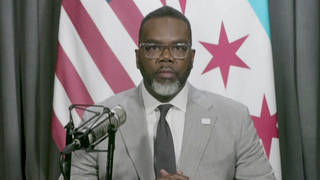
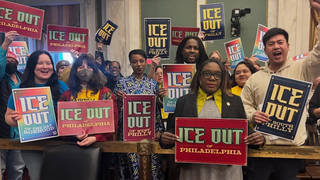
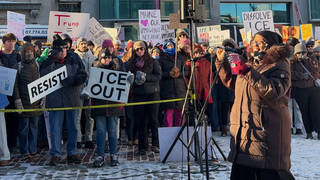
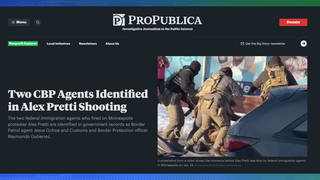







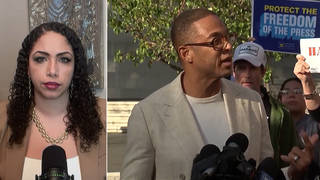
Media Options